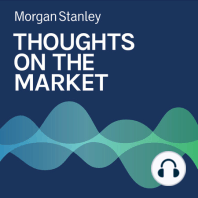4 min listen

Vishy Tirupattur: A Change in Fed Policy Expectations
Vishy Tirupattur: A Change in Fed Policy Expectations
ratings:
Length:
4 minutes
Released:
Feb 9, 2023
Format:
Podcast episode
Description
With the latest U.S. employment report showing unexpected resilience in the labor market, what happens now for the Fed and the policy tightening cycle?----- Transcript -----Welcome to Thoughts on the Market. I'm Vishy Tirupattur, Morgan Stanley's Head of Fixed Income Research and Director of Quantitative Research. Along with my colleagues, bringing you a variety of perspectives, today I will discuss the market implications from the latest U.S. employment report. It's Thursday, February 9th at noon in New York. When it comes to economic data releases, there are surprises and there are shockers. Last Friday's U.S. employment report was clearly in the latter category. Ahead of the release, the market consensus estimate was for 185,000 new jobs based on Bloomberg's survey of 77 economists. And yet the Bureau of Labor Statistics reported 517,000 new jobs added during the month, which is about eight and half standard deviations from the average expectation of the Bloomberg survey participants. By any measure, that's huge. The report showed strength across the board. Of course, there were some temporary drivers, like technical adjustments to seasonality factors, mild weather in January, and a resolution of certain strikes that contributed to this large scale boost to the January employment data. These things are unlikely to persist. Still, the U.S. labor market remains far more resilient than previously expected, with really no clear signs of stopping on the Monday following the January data release, Fed Chair Powell struck a more hawkish tone as he emphasized there is a significant road ahead before policymakers would be assured that inflation is returning to the 2% target. So what happens now? Even if the January employment report is not indicative of a change of trajectory in the U.S. labor market, it will likely take a few more months for the true underlying trends to emerge. Respecting the strength of the current labor market conditions, our U.S. economists believe that more evidence of labor market slowing is needed for the Fed to consider an end of the tightening cycle. Therefore, they now expect the Fed to deliver a 25 basis point hike, both in March and in May, that brings the peak policy rate to range of 5% to 5.25%, which would be in line with the FOMCs December projections. Given the change in the expectation for the Fed policy path, our strategists across multiple markets have revised many of our market goals. I would like to flag three key tactical changes. First, we turn neutral on U.S. Treasuries versus our previous overweight recommendation. Considering how big of an outlier the job number was, we think hard data is too strong for the Fed to look past it. With this realization, we think investors no longer assume that the interest rates have peaked. The market debate will likely turn into the interest rate sensitivity of the economy, and if the neutral rate should be higher than previously thought. Until we have greater clarity on these issues, we think being neutral is a better call on treasuries. Second, in the foreign exchange market, we turn neutral on the U.S. dollar, versus our previous call for a weakening dollar. The strong U.S. labor market data will likely cause investors to question whether the U.S. economy is slowing relative to the rest of the world. As a result, investors are likely to be a little more bullish in their U.S. dollar positioning. Third, in the agency mortgage market, we turned to underweight from neutral. The January employment report increases the uncertainty of the rate paths, which means higher interest rate volatility going forward, that's not great for agency MBS. Relative to other fixed income securities, we don't think investors are being compensated sufficiently for this higher interest rate uncertainty. Thanks for listening. If you enjoyed the show, please leave us a review on Apple Podcasts and share Thoughts on the Market with a friend or colleague today.
Released:
Feb 9, 2023
Format:
Podcast episode
Titles in the series (100)
Mike Wilson: Weighing a Potential Fed Rate Cut by Thoughts on the Market